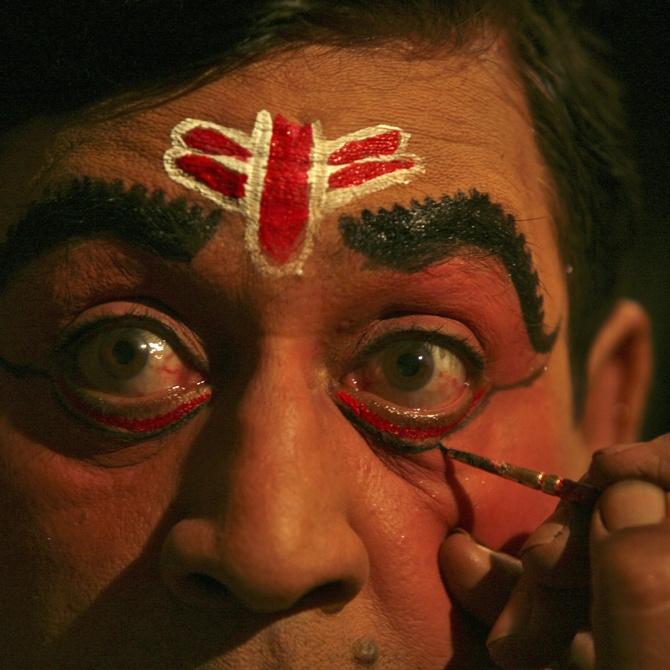Photographs: Mukesh Gupta/Reuters Anand Neelakantan
There is much to learn from the life of Ravana says Anand Neelakantan, author of Asura, tale of the vanquished, the story of Ravana and his people.
In an exclusive column for Rediff.com, Anand Neelakantan says that the extraordinary villain of Ramayana may just have a few useful lessons for us:
Traditional Indian wisdom places importance on the control of one's emotions and projects the intellect alone, as the being supreme.The great King Mahabali, advises Ravana to shun the other nine base emotions of anger; pride; Jealousy; happiness; sadness; fear; selfishness; passion and ambition. Intellect alone is to be revered.
In reply to Mahabali, Ravana answers thus:
Why should pride and vanity be held in contempt? I feel proud about myself for having immense energy and the will to succeed.If I struggle hard in my life to achieve success, I have every right to be proud of it; I have every right to bask in vanity and luxury. Success breeds pride and vanity. And pride is the only reward of success.
Anger is a basic emotion of life. Can't I be furious when thousands live in inhuman condition? Anger will electrify my thoughts and push me into positive action?
Jealousy is the biggest force that motivates humankind. Why do empires compete with each other, if not motivated by the jealousy they feel? Jealousy is the driving force of progress; envy is the motivating force of life. To deny jealousy is to deny the basic instincts of man.
Equanimity in sadness and happiness, is this possible ever? When my beloved ones depart from this world, should I deny myself the consolation of crying? If I become incapable of feeling happiness, what shall become of me?Is life without happiness or sadness worth living?
Fear is the greatest instinct of man and beast. I am not afraid to say that I am scared. I am aware with every breath I take that I take steps towards my death. But I am not a coward to deny the existence of fear. It is this fear that helps me remain prepared for dangers that I must face. It is fear that makes me understand that there are things that I cannot control and helps me to understand God and myself.
Selfishness has built great cities around the world and is the very foundation of ambition. When I see a lovely girl, a fascinating place, a charming village, a sparkling diamond, a prosperous country, ambition flutters in my soul. I want the charms of this world to be mine and mine alone. I am willing to risk being known as the most selfish man in the world,rather than dying unknown as a selfless non-entity."
Without love, without the king of emotions, nothing exists. If one has not felt the painful need to be with one's lover, if you do not feel the love for your own brothers, sisters, your father who made you, your mother who carried you in her womb and raised you with her blood and milk, for friends and those little cherished moments of togetherness, your wife for sharing your life with you and for your children for carrying your life forward, then is this life worth living? People have died for love in the past and will continue to do so as long as the world exists. I love because I exist and I exist because I love -- I love myself.
Ambition is the key to progress. Without ambition, men would have remained hunters. There would not have been wheels, horse carts or chariots, magnificent cities, temples and palaces, or majestic sailing ships.
No mendicant living in a forest ever conceived a great city; no sage was determined to build the great temples, no saint desired to build great ships for commerce and trade. These were built by men who had pride in their veins, anger in their minds, who cried when they felt sad and laughed when they were happy, who were frightened when confronted by forces or events bigger than themselves, but strove forward with determination and a selfish love for all that they cherished. Intelligence is just a tool to serve our emotions and I want to live as God intended man to live.
My aim is neither become God nor to achieve moksha. I do not believe in a heaven where you will be given all that you purposefully denied yourself in this world. I shall live like a man and die as one. I will never try to be a God. I will live exactly as my emotions tell me to. I do not want to be a model man for future generations to follow. My life begins with me and ends with me. But I will live my life to its full and die as a man should. I am a man with ten faces -- I am Dasamukha.
That sums up why we should admire Ravana.
![]() Anand Neelakantan is the author of Asura, tale of the vanquished, the story of Ravana and his people and Ajaya, epic of Kaurava clan, Roll of the dice, book I, the Mahabharata of Kauravas that can be purchased here and here.
Anand Neelakantan is the author of Asura, tale of the vanquished, the story of Ravana and his people and Ajaya, epic of Kaurava clan, Roll of the dice, book I, the Mahabharata of Kauravas that can be purchased here and here.


Comment
article